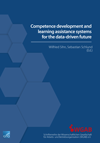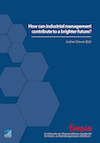Search


Bibtex
Cite as text
@Article{,
Year= "2021",
Volume= "Schriftenreihe der Wissenschaftlichen Gesellschaft für Arbeits- und Betriebsorganisation (WGAB) e.V.",
Pages= "125-142",
Journal = "WGAB",
Title= "How a learning factory approach can help to increase the un- derstanding of the application of machine learning on production planning and control tasks. ",
Author= "Alexander Rokoss M.Sc.
Institute of Product and Process Innovation Leuphana University Lüneburg
Kathrin Kramer M.Sc.
Institute of Product and Process Innovation Leuphana University Lüneburg
Prof. Dr.-Ing. habil. Matthias Schmidt
Institute of Product and Process Innovation Leuphana University Lüneburg
",
Doi= "https://doi.org/10.30844/wgab_2021_8",
Abstract= "Technological progress and increasing digitalization offer many opportunities to production companies, but also continually present them with new challenges. The automation of processes is progressing in manufacturing areas and technical support systems, such as human-robot collaboration, are leading to significant changes in workflows. However, in other areas of companies large parts of the work are still done by humans. This is partly the case with the use of production data. Although much data is already collected and sorted automatically, the final evaluation of this data and especially decision-making is often done by humans. In particular, this is the case for decisions that cannot clearly be made based on conditional programming.
The use of machine learning (ML) represents a promising approach to make such complex decisions automatically. A sharp increase in scientific publications in the recent years demonstrates the trend that more and more companies and institutions are looking into the use of machine learning in production. Since ML is beeing applied across several industries, the resulting massive shortage of skilled workers in the field of ML has to be addressed in short and medium terms by training and educating existing employees in production companies.
A contemporary approach to building competencies in dealing with problems in the manufacturing sector is the use of learning factories as a knowledge transfer enabler. They offer learners the opportunity to try out methods in a realistic environment without having to fear negative consequences for the company. The results of actions performed by participants can be experienced directly without any time delay, resulting in better learning results compared to conventional face-to-face teaching.
This chapter shows how learning factories can support teaching machine learning methods in the field of PPC. For this purpose, the determination of lead times using real data sets is addressed with ML-based methods. Parallelly, the competencies required for the respective tasks were extracted. Based on this, elements of a learning factory were designed that simplifies the considered processes, so that the problem can be easily understood by learners. The last part of the chapter describes several learning factory game phases aiming on teaching the identified competencies. The described learning factory enables participants to setup ML-based projects in the context of manufacturing.
",
}
Alexander Rokoss M.Sc.
Institute of Product and Process Innovation Leuphana University Lüneburg
Kathrin Kramer M.Sc.
Institute of Product and Process Innovation Leuphana University Lüneburg
Prof. Dr.-Ing. habil. Matthias Schmidt
Institute of Product and Process Innovation Leuphana University Lüneburg(2021): How a learning factory approach can help to increase the un- derstanding of the application of machine learning on production planning and control tasks. . Schriftenreihe der Wissenschaftlichen Gesellschaft für Arbeits- und Betriebsorganisation (WGAB) e.V.(2021), S. 125-142. Online: https://doi.org/10.30844/wgab_2021_8 (Abgerufen 24.02.26)
Open Access
Abstract
Abstract
Technological progress and increasing digitalization offer many opportunities to production companies, but also continually present them with new challenges. The automation of processes is progressing in manufacturing areas and technical support systems, such as human-robot collaboration, are leading to significant changes in workflows. However, in other areas of companies large parts of the work are still done by humans. This is partly the case with the use of production data. Although much data is already collected and sorted automatically, the final evaluation of this data and especially decision-making is often done by humans. In particular, this is the case for decisions that cannot clearly be made based on conditional programming. The use of machine learning (ML) represents a promising approach to make such complex decisions automatically. A sharp increase in scientific publications in the recent years demonstrates the trend that more and more companies and institutions are looking into the use of machine learning in production. Since ML is beeing applied across several industries, the resulting massive shortage of skilled workers in the field of ML has to be addressed in short and medium terms by training and educating existing employees in production companies. A contemporary approach to building competencies in dealing with problems in the manufacturing sector is the use of learning factories as a knowledge transfer enabler. They offer learners the opportunity to try out methods in a realistic environment without having to fear negative consequences for the company. The results of actions performed by participants can be experienced directly without any time delay, resulting in better learning results compared to conventional face-to-face teaching. This chapter shows how learning factories can support teaching machine learning methods in the field of PPC. For this purpose, the determination of lead times using real data sets is addressed with ML-based methods. Parallelly, the competencies required for the respective tasks were extracted. Based on this, elements of a learning factory were designed that simplifies the considered processes, so that the problem can be easily understood by learners. The last part of the chapter describes several learning factory game phases aiming on teaching the identified competencies. The described learning factory enables participants to setup ML-based projects in the context of manufacturing.

 English
English
